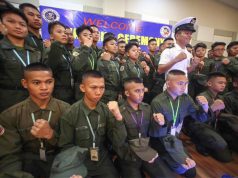
The designation of Matteo Guidicelli as the newest youth ambassador of National Youth Commission raised questions on why and how the Filipino-Italian actor was chosen.
The 29-year-old Philippine Army reservist was granted the title through the government agency’s Resolution No. 26 (series of 2019) that recognizes his “significant contribution to youth development.”
Any copy of the document is not available on NYC’s website, nor on its social media pages.
The only explanation provided by the agency is written on a Facebook post, where an excerpt of it reads:
“Mr. Guidicelli’s patriotism and nationalism, initially manifested by being a military reservist, is expected to serve as inspiration and encouragement for the Filipino youth in the fulfillment of their role in nation-building.”
“The NYC looks forward to further enhance youth empowerment by designating youth ambassadors who can be role models of good citizenship through this recognition.”
MATTEO GUIDICELLI IS NYC YOUTH AMBASSADORThe National Youth Commission (NYC) officially designates the Filipino actor…
Posted by National Youth Commission on Monday, March 2, 2020
Guidicelli simply thanked the agency with a tweet accompanied by an emoji of the Philippine national flag.
An honor and privilege. Thank you. 🇵🇭 https://t.co/VmJzpU7rXc
— Matteo Guidicelli (@mateoguidicelli) March 2, 2020
The youth commission is a policy-making coordinating body of all youth-related institutions, programs, projects and activities of the government.
It envisions itself as “the voice and advocate of the youth” and aspires to mold them as “enabled, involved” and “patriotic” individuals.
Uniformed
Matteo Guidicelli’s designation as an NYC ambassador, while welcomed by some, was questioned by others who claimed to be unaware of his “significant contribution to youth development.”
“Pwede pa-post ng contributions niya sa Filipino youth, kung meron?! Curious eh,” a Twitter user commented.
“But can it be qualified what his contributions are?” another user commented.
“Ano ba ang competencies nitong si Matteo para maging qualified siya sa posisyon? Or ang mismong NYC ang hindi nag-set ng required minimum competency?” a Filipino likewise wondered.
The NYC in its post only cited Guidicelli’s involvement in the Philippine Army as a reservist which they said is a manifestation of his “patriotism and nationalism” that the Filipino youth must have.
The actor was sworn as a member of the Army Reserve Command in April 2019. He also participated in a 30-day training program for Scout Rangers, the Army’s Special Operations Commands Unit.
Guidicelli currently holds the rank of a second lieutenant in the Army Reserve.
His intention to join the military previously triggered online conversations among Filipinos on what it means to be patriotic.
When a Twitter user claimed that the Army is “probably one of the least patriotic organizations in the country” and alleged it is “more concerned with defending foreign capitalists and big businesses,” the actor snapped and told him to “just stop talking.”
Critics also told him that there are other ways to be patriotic as they cited his fellow Kapamilya actress, Angel Locsin, who expresses her love for the country through volunteering in non-profit organizations and helping out communities.
Patriotism refers to believing in the “inherent goodness of the system of government in a country, and the goodness of its people.”
It is totally different from nationalism, an ideology many thinkers say is dangerous. Some people confuse nationalism with “national identity,” but they are not the same. Historian Kim Holmes, executive vice president of think tank Heritage Foundation, writes:
There is nothing universal about nationalism except that all nationalisms are, well, different and particularistic. Nationalism is devoid of a common idea or principle of government except that a people or a nation-state can be almost anything. It can be fascist, it can be authoritarian, it can be totalitarian, or it can be democratic.









